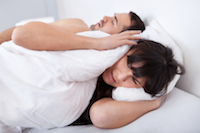 A study published in the Journal of Clinical and Sleep Medicine says there's an optimal sleep range for older adults which can help improve your brain function. After studying some 30,000 adults over age 50 in six nations, it was concluded that six to nine hours of sleep per night is the ideal, in order to maintain the highest cognitive abilities.
A study published in the Journal of Clinical and Sleep Medicine says there's an optimal sleep range for older adults which can help improve your brain function. After studying some 30,000 adults over age 50 in six nations, it was concluded that six to nine hours of sleep per night is the ideal, in order to maintain the highest cognitive abilities.
Subjects who slept less than six hours or more than nine hours performed significantly worse in tests measuring memory, recall and verbal fluency than those who slept six to nne hours.
Interestingly, other results showed that women overall slept longer than men, but with poorer sleep quality. Researchers suggest that in terms of preventing age-related cognitive decline, it is critical to encourage good quality restorative sleep in older adults. Several studies have shown the health risks of too little sleep among older adults. The affects on the body of not getting good quality sleep on a regular basis can mimic Alzeimer’s-like symptoms. Lack of sleep also reduces learning ability and memory function.
Remember these tips to improve the quality of your sleep:
Reduce bedtime snacks
Late-night meals prevent your body from cooling down during sleep and raise your insulin level, resulting in less cell-boosting melatonin and growth hormone being released while you sleep.
Sleep in the dark
Even a small amount of light interferes with the release of melatonin and growth hormone. Cortisol also remains high when you are exposed to light. Electromagnetic fields (EMFs) from electrical devices and digital alarm clocks in your bedroom may disrupt your pineal gland and the production of melatonin and serotonin. Keep phones and light emitting devices at least a metre from the bed an turn the light source away from you.
Drink less at night
Waking to go to the bathroom interrupts your natural sleep patterns. If you turn the light on when you go, you also run the risk of suppressing melatonin production. Limit caffeine and alcohol in the couple of hours before bedtime as well.
Relax
Regular exercise can certainly help you sleep better, but try not to exercise late at night. A late-night cardio session raises body temperature, preventing the release of melatonin.
Read a book
Many of us enjoy watching favorite TV shows, catching up on emails, or surfing the Net in the evening, but too much time in front of either screen close to bedtime can interfere with a good night's rest. Try a book instead.
Don’t overheat bedrooms
It’s normal to want to feel cozy in bed, but a sleep environment that's too warm can prevent the natural cooling that should take place in your body while you sleep.
Get undressed
Your favorite PJs or your birthday suit can actually help you sleep better. Wearing tight-fitting clothing at bedtime — even a bra or underwear — appears to raise your body temperature. Make sure whatever you wear to bed is made of a natural breathable fabric and is loose fitting.
When your sleep is insufficient, your cortisol and hunger hormones both surge, causing a corresponding increase in insulin. You also experience decreases in leptin, melatonin, growth hormone, testosterone, and serotonin, all of which lead to weight gain. Be relaxed and happy at bed time and if you are having trouble nodding off, get up and read for a bit, until you do feel drowsy. There’s no surer way not to sleep that to lie and stew about it!









Join the Discussion
Type out your comment here:
You must be logged in to post a comment.